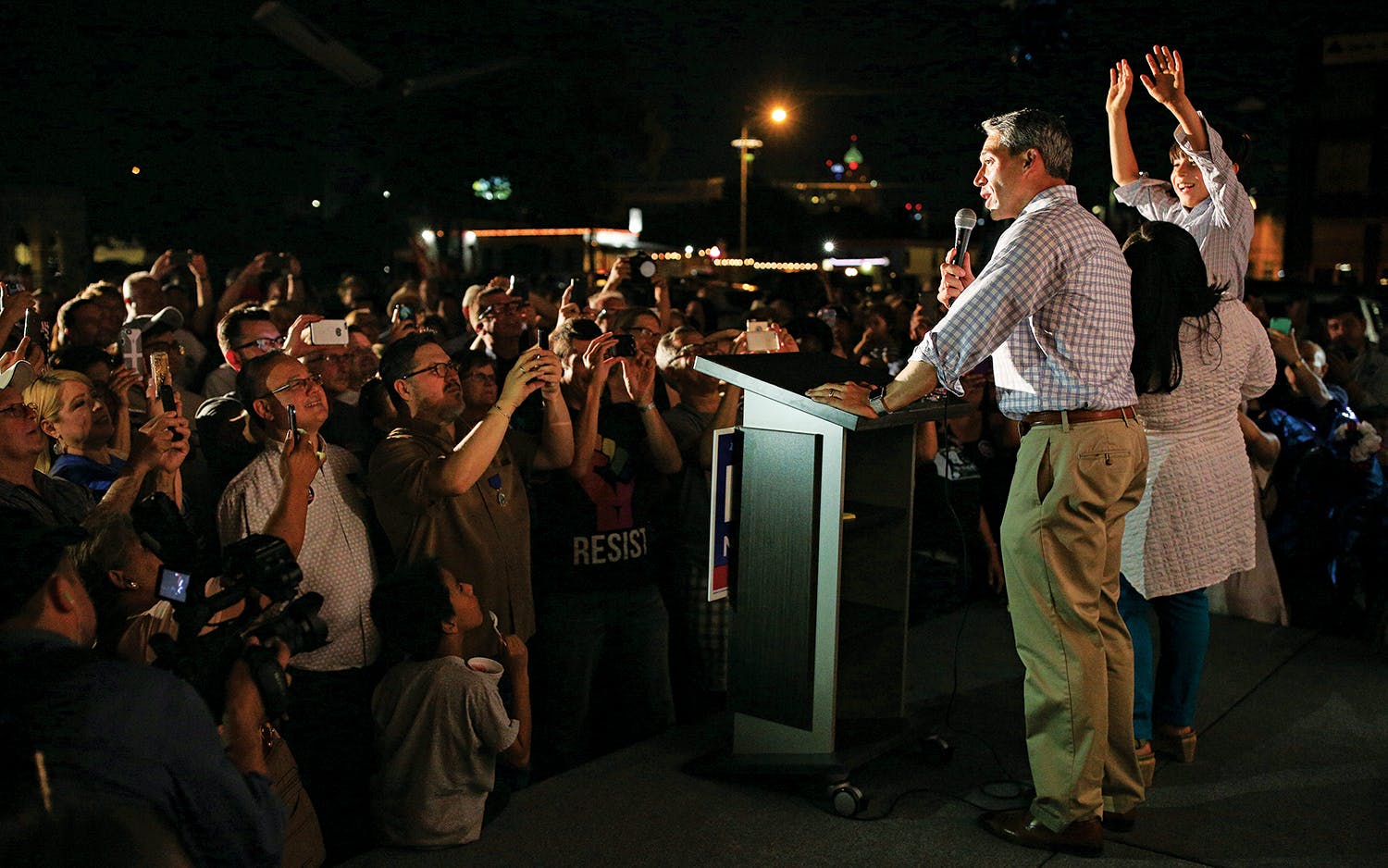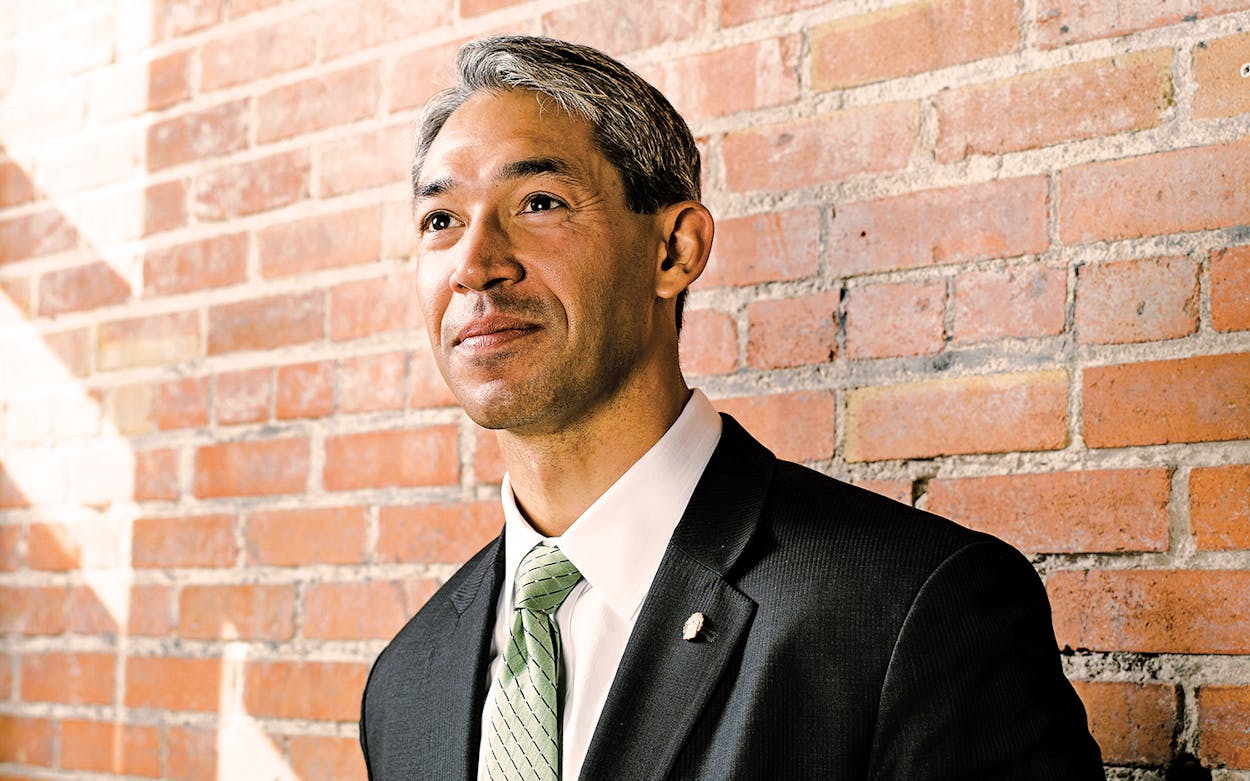On June 10, San Antonio mayor Ivy Taylor lost her re-election bid to Ron Nirenberg, a city council member from the affluent North Side. Whereas Taylor is socially conservative, averse to drama, and business-oriented, Nirenberg is a charismatic and avowedly progressive one-man melting pot, a weight lifter and music fan who boasts Filipino, British, Indian, Malay, and Eastern European Jewish heritage. The forty-year-old Massachusetts native, who was raised in Austin and graduated from Trinity University, has called for the Alamo City to oppose recent actions by both the Trump administration and state government, including American withdrawal from the Paris Agreement and Texas’s new sanctuary cities law.
Christopher Hooks: A lot of people thought this race was a long shot for you. What made you think you could win?
Ron Nirenberg: I didn’t really have a choice. When [former mayor] Julián Castro left, it became very clear that Mayor Taylor had a different agenda than I did and was threatened by me. I figured I had three options: One was to grin and bear it. Two was to just walk away from politics. Three was to change the conversation. The only way that I saw to move the city in a more positive direction was a change in leadership. I ran for mayor, sort of on faith that this was my only choice.
CH: You’re a relative newcomer to elected office—you won your city council seat in 2013. What made you want to enter public service?
RN: It was a slow evolution. When my son was born [in 2008], I went back to Trinity University to teach in their communications department and run their jazz radio station. As the station’s general manager, I had a role in the arts community, which is really the foundation of San Antonio’s identity. I quickly found out that what was getting me up in the morning wasn’t the part of my job that involved managing a staff and programming the station. It was the part that took me out of the office to create connections in the community.
I got involved in a leadership program at the San Antonio Hispanic Chamber of Commerce and that convinced me that I should be doing things that bring me energy, such as being out in the community, examining policy, and trying to figure out how to build the new San Antonio. That’s when I asked my wife, “What do you think?” She said, “Yeah, go for it.”
CH: There have been a couple of elections in San Antonio over the past few years in which Republican voters have played a decisive role. You were somebody who was described as “Liberal Ron” during the mayoral election, and you won. Do you feel like this election is part of the backlash to the election of President Trump?

RN: No. Municipal voter turnout in San Antonio is embarrassingly low, and that’s something that drives me. If there’s a central backbone to the work that I do, it’s civic engagement. I ran for city council on a fairly progressive agenda. That’s not typically what a candidate in a North Side district would run on, but I won, against an establishment that outspent me four to one.
I was able to operate as a North Side council member with a progressive agenda by doing it in a way that left nobody surprised about the decisions I was making. I’m convinced that, especially at this level, it’s not conservative versus progressive, or Democrat versus Republican. There are issues that move cities forward, where there’s more common ground than separation.
CH: What will be at the top of your agenda?
RN: Our economy and our quality of life hinge on whether or not our city has the gumption to build a modern transportation system. We’ll be the size of Chicago in the next thirty years, whether we like it or not. I also want to ensure that we have a strong housing policy, and that our city can confidently reinvest in communities without forcing people out of their homes. And, obviously, public safety is a huge priority.
If I had to boil it down to one thing: I was asked at a forum a few months ago, “How will the city be markedly different if you’re in office?” And I would say that I want the residents of San Antonio to trust their government and to participate in it, knowing that we’re working for them. My passion truly is in civic engagement, civic participation. Across the board, the problems that we’re facing as cities and nations have to do with people not believing that their voice matters. That’s what I want to change.
CH: In 2014, you were instrumental in putting together a deal to save San Antonio’s Bracken Cave—home to the largest bat colony in the world—from development. What made you want to get involved?
RN: I like lost causes. I liked the fact that everyone knew what the right outcome was, but no one seemed willing to try to do it. I have a young son who was interested in the issue, and I’m interested in preserving the environment for him to have when he’s older. He’d ask me every single day when I first got elected, “Have you saved the bats yet?” It was really cool about a year or so later when I finally said, “Yeah, we saved the bats.” It solidified why I’m doing this work, which is that I’m trying to preserve our community and make this city better for him.
CH: Where’s the best breakfast taco in San Antonio?
RN: You’re going to get me in trouble. Taco Taco is great—love that place. They have these pancake-thick tortillas. I love Pete’s, at Avenue B and Brooklyn. Carmelita’s, on Broadway. We spent a veritable fortune on breakfast tacos for our campaign. There’s probably fifty more I could put on the list, but those are my three favorites.
This interview has been edited for clarity and length.
- More About:
- Politics & Policy
- San Antonio









